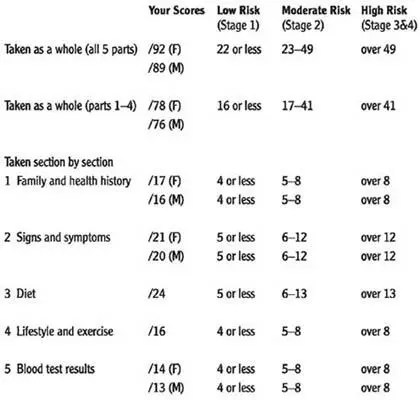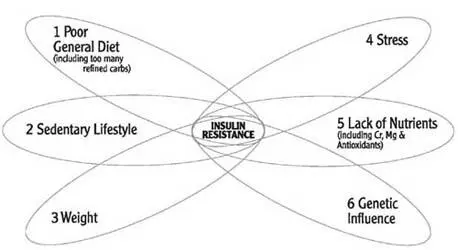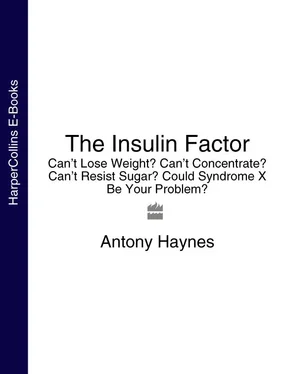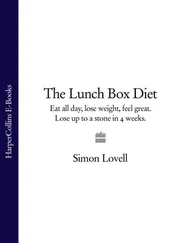Use the chart below to note your scores and total them up.
| 1 Family and Health History |
/17(F) |
|
/16 (M) |
| 2 Signs and Symptoms |
/21 (F) |
|
/20 (M) |
| 3 Diet |
/24 |
| 4 Lifestyle and Exercise |
/16 |
| 5 Blood Test Results |
/14(F) |
|
/13 (M) |
|
_______ |
| Total |
/92 (F) |
|
/89 (M) |
Interpreting the questionnaire
Whilst your total score is perhaps the most important indicator of overall risk for Insulin Resistance, the individual parts also have relevance. Both are categorized according to risk in the table below.

The Insulin Resistance questionnaire indicates the degree of Insulin Resistance you may have. The following text clarifies your risk of Insulin Resistance, and will help you plan your dietary and lifestyle changes.
1 Family and Health History:As only two elements in this section can change (weight and age), this is a relatively fixed score. This sets the scene for your risk, but does not determine it.
2 Signs and Symptoms:If you scored highly on this part of the questionnaire, together with a moderate risk total score or more, it suggests that you could be at a moderately advanced stage of Insulin Resistance, particularly if you are overweight. You need to follow all parts of the Insulin Factor Plan.
If you score highly on this section but only score a low risk on all other parts of the questionnaire, then consider taking the Adrenal Stress Profile saliva test and study chapter 9 on stress. You will also need to follow the dietary plan in chapter 13, and the Adrenal Support Supplement Programme.
3 Dietary Factors:If you scored highly on this part but not on the others, this puts you at risk of being in the early stages of Insulin Resistance, and increases your risk of developing it in due course. Eating refined carbohydrates represents the single biggest risk factor for developing Insulin Resistance. This risk is more pronounced if you score highly in part 4, Lifestyle and Exercise. You need to concentrate on the dietary plan in chapter 13, and follow the Insulin Resistance Supplement Plan One.
4 Lifestyle and Exercise:If you score highly in this section only then is there a need to start becoming more physically active. Even if you are not overweight you could well be in the early stages of Insulin Resistance. Inactivity is a profoundly important risk factor for Insulin Resistance, especially if you’ve scored highly in part 3 of the questionnaire, Dietary Factors. You need to read chapter 10 and find out the most suitable exercise for you.
5 Blood Test Results:These give ‘hard’ evidence of your current degree of Insulin Resistance, which is examined in more detail here. It is unlikely that a high score in this part would not be matched by high scores in other parts of the questionnaire. Don’t worry if your test results score highly: it doesn’t mean you can’t change them, far from it. In fact, the blood tests are an excellent way to monitor your improvements when you implement the Insulin Factor Plan.
Your total questionnaire score, for either four or five parts, represents your baseline score, which will improve when you begin to implement the Insulin Factor Plan. Please redo parts 2 to 4 or 2 to 5 inclusive (not part 1, unless you have lost weight and are a year older) one month after you begin any changes in diet, nutrition and exercise to see the reduction in your scores. This is a good way of monitoring how you are doing, and will hopefully encourage you to keep going. If your score does not go down at all, please review chapter 12, which provides you with the model of how to reverse Insulin Resistance, and double check that you have gone through the action steps and check lists. If, within another month, there is still no change, it would be best to go and see a qualified nutritionist (see Resources).
There are many other questionnaires in this book but the Insulin Resistance questionnaire is the most important. Keeping your results of the questionnaires in mind, let’s now take a look at the six major causes of Insulin Resistance and how your questionnaire results tie in with them.
The six major causes of Insulin Resistance
There are six major causes of Insulin Resistance and your results from the questionnaires will show you how much of a contributor each one is to you.
1 General diet:eating too many refined carbohydrates and over-processed foods (this includes low nutrient levels and an imbalance in dietary fats – see chapters 5–8)
Measured by the Diet Questionnaire
2 Sedentary lifestyle:lack of physical activity and exercise, and lack of muscle (see chapter 10)
Measured by Exercise and Lifestyle Questionnaire
3 Weight:being overweight and/or having an elevated BMI (see this chapter)
Measured by BMI calculation, observation and body composition measurements
4 Stress:abnormal stress hormones (cortisol and DHEA) have a negative effect on Insulin Resistance (see chapter 9)
Measured by Stress Questionnaire and adrenal hormone saliva test
5 Lack of nutrients:chromium, magnesium, essential fats, other nutrients (trace minerals, minerals, vitamins) including antioxidants (see chapters 6, 7and 8)
Measured by Diet and Signs and Symptoms Questionnaires and blood tests
6 Genetic influence:a family history of diabetes, heart disease and obesity and being of South Asian, African, Polynesian or Mexican origin (see chapter 11)
Measured by Family and Health History Questionnaire

Whatever your ethnic origin, your risk of Insulin Resistance increases as you get older. If you remain active, take gentle exercise to reduce loss of muscle mass, reduce the amount of calories you eat but increase the quality of your nutrient intake (as we age we become less efficient at digesting food), your age will not work against you and you will also find that you age more slowly.
However, it is also true that Insulin Resistance is becoming increasingly common in younger and younger people and a person’s chronological age is a less obvious risk factor than it once was. In actual fact, people who develop Insulin Resistance as early as the late teens and early twenties have a prematurely aged metabolism – i.e. they have the metabolism you’d expect to see in someone at least twice their age. Don’t worry if this sounds like you. Not only will the Insulin Factor Plan put your insulin and glucose levels back on track but it will also help you take years off your body’s biological age – the best kind of side-effect!
See Resourcesfor help interpreting your Insulin Resistance Blood Test.
If you have done a blood test and know what degree of Insulin Resistance you have, turn to the Resources. However, without a blood test you can still get a good idea about what degree of Insulin Resistance you have, and take the appropriate action as outlined below. Your questionnaire scores will reflect a low, moderate or high risk of Insulin Resistance, which correlate with the different stages of Insulin Resistance that would be determined by the blood test.
Читать дальше














